Special Report
29 Countries the US Government Doesn't Want You to Go To
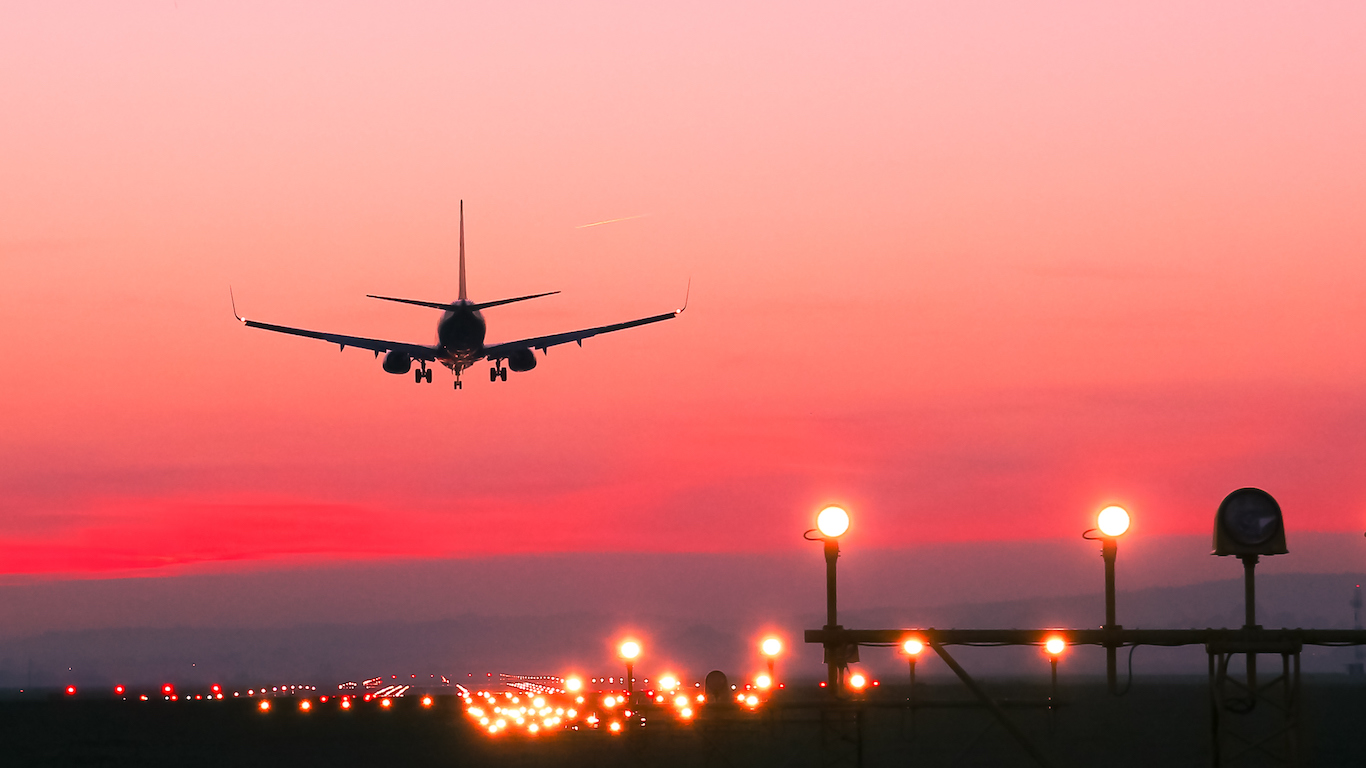
Published:
Last Updated:

A record number of Americans are forecast to travel to other countries this year, buoyed by a strong dollar and a surging economy. Last year, the number of U.S. visits overseas rose by 9.1% from the previous year to 38.3 million, according to data from U.S. Department of Commerce, International Trade Administration, and the National Travel and Tourism Office. The number of visits to Europe, at nearly 16 million in 2017, climbed 16% — the most of any region.
With so many Americans traveling, it would be in their best interest to check the U.S. State Department’s website for travel advisories, which the department is constantly updating. The advisories are intended to keep Americans who are traveling aware of potential terrorist attacks, civil unrest, and level and nature of crime in other nations.
24/7 Wall St. has compiled a list of the 29 countries the U.S. government doesn’t want you to go to.
Click here to see the 29 countries the U.S. government doesn’t want you to go to.
Click here to read detailed findings and methodology.
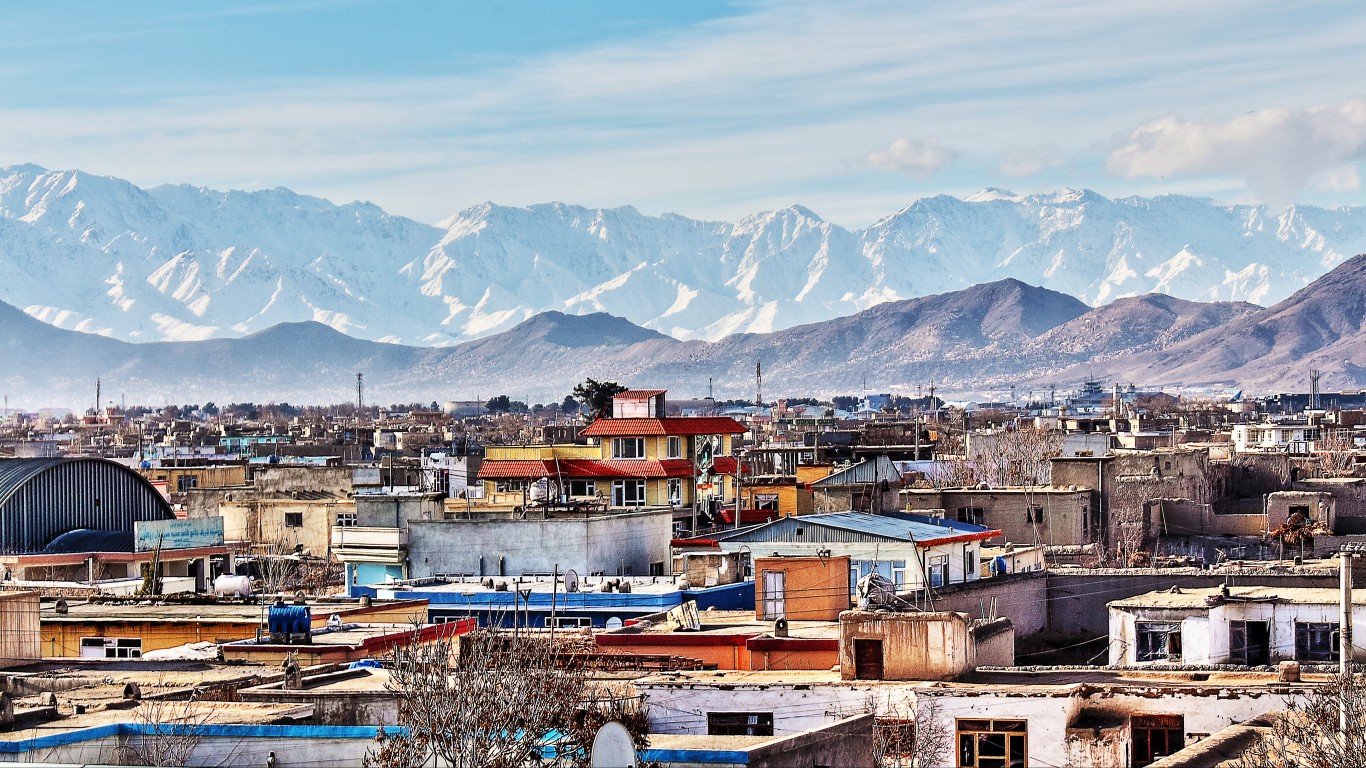
1. Afghanistan
> Advisory level: Level 4: do not travel
> Last updated: July 9
> Population: 34.7 million
> GDP per capita: $580
With the Taliban and ISIS still forces to be reckoned with, the State Department has advised that travel to all areas of Afghanistan is unsafe because of high levels of kidnappings, hostage taking, suicide bombings, military combat operations, landmines, and terrorist and insurgent attacks. Terrorists have targeted Afghan and U.S. government convoys and facilities as well as non-governmental organization offices, hospitals, places of worship, restaurants, hotels, airports, and schools.
The U.S. government’s ability to provide services to Americans in Afghanistan is constrained because of the lack of infrastructure, geographic limitations, and a volatile security situation.
[in-text-ad]

2. Burkina Faso
> Advisory level: Level 3: reconsider travel
> Last updated: March 2
> Population: 18.6 million
> GDP per capita: $610
While the general advisory to Burkina Faso is level 3 – reconsider travel, the State Department advises against traveling to one region in the country — the northern Sahel border with Mali and Niger. In that region, organized criminal groups and terrorists particularly target westerners, plotting kidnappings. In the entire country — a landlocked nation in western Africa — terrorist targets could include hotels, restaurants, police stations, and schools.
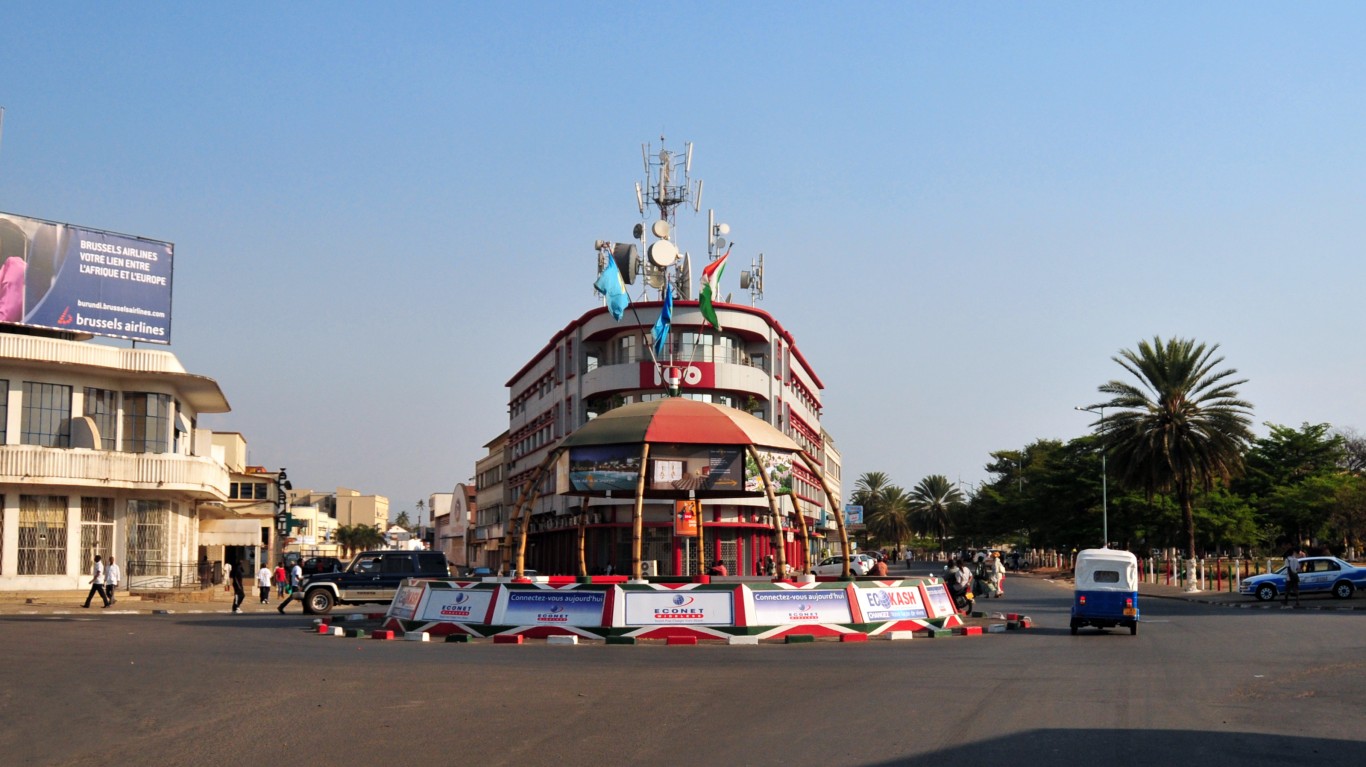
3. Burundi
> Advisory level: Level 3: reconsider travel
> Last updated: Aug. 29
> Population: 10.5 million
> GDP per capita: $280
Though westerners are not likely targets of violent crimes in Burundi, grenade attacks and armed robbery are common. Burundi police resources are inadequate to address criminal acts, according to the U.S. government. There also is lingering political tension in the African nation, whose GDP per capita of $280 is among the lowest in the world. Frequent police and military checkpoints limit the ability to move freely. The U.S. government says the provinces of Cibitoke and Bubanza are susceptible to raids from armed groups from the eastern section of the Democratic Republic of Congo.
The U.S. government said it has scarce resources to provide to Americans in Burundi. The State Department added that medical services in Burundi are not up to American standards.

4. Central African Republic
> Advisory level: Level 4: do not travel
> Last updated: May 24
> Population: 4.6 million
> GDP per capita: $380
Another high-risk country is the Central African Republic, which has been unstable since it gained independence from France in 1960. The State Department advises Americans not to travel to the CAR because of crime and civil instability. The U.S. government has raised concerns over incidences of armed robbery, aggravated battery, and homicide. Many swaths of the Central African Republic are controlled by armed groups who kidnap, injure, and kill civilians, according to the U.S. government. Because of unrest in the Central African Republic, airports, land borders, and roads may close with little advance notice.
U.S. government personnel must get permission to travel outside the embassy grounds and therefore may be limited in how much help they can provide U.S. citizens.
[in-text-ad-2]

5. Chad
> Advisory level: Level 3: reconsider travel
> Last updated: July 31
> Population: 14.5 million
> GDP per capita: $720
Chad has been victimized by violent crimes, such as armed robbery, carjacking, and muggings. Terrorists have targeted foreigners, local security forces, and civilians. The U.S. government says terrorists can cross Chad’s borders with little difficulty, including in the Lake Chad region. Of particular concern are unmapped minefields along the borders with Libya and Sudan.
U.S. government employees need to get special permission to travel to certain parts of the capital N’Djamena, as well as areas such as to the Lake Chad Basin.

6. Democratic Republic of the Congo
> Advisory level: Level 3: reconsider travel
> Last updated: Feb. 28
> Population: 78.7 million
> GDP per capita: $460
The U.S. government says some areas of the Democratic Republic of the Congo have an increased level of risk. Americans are urged not to travel to the eastern part of the Democratic Republic of the Congo and the three Kasai provinces because of violence. Armed robbery, home invasion, and assault are among the crimes that often occur in the DRC. In the Democratic Republic of the Congo, assailants have been known to impersonate police or security agents. Police in the DRC lack the resources to combat violent crime. The Democratic Republic of the Congo is also grappling with a worsening Ebola outbreak.
The U.S. government has limited ability to provide emergency services to Americans outside of the capital Kinshasa because of inadequate infrastructure and security.
[in-text-ad]
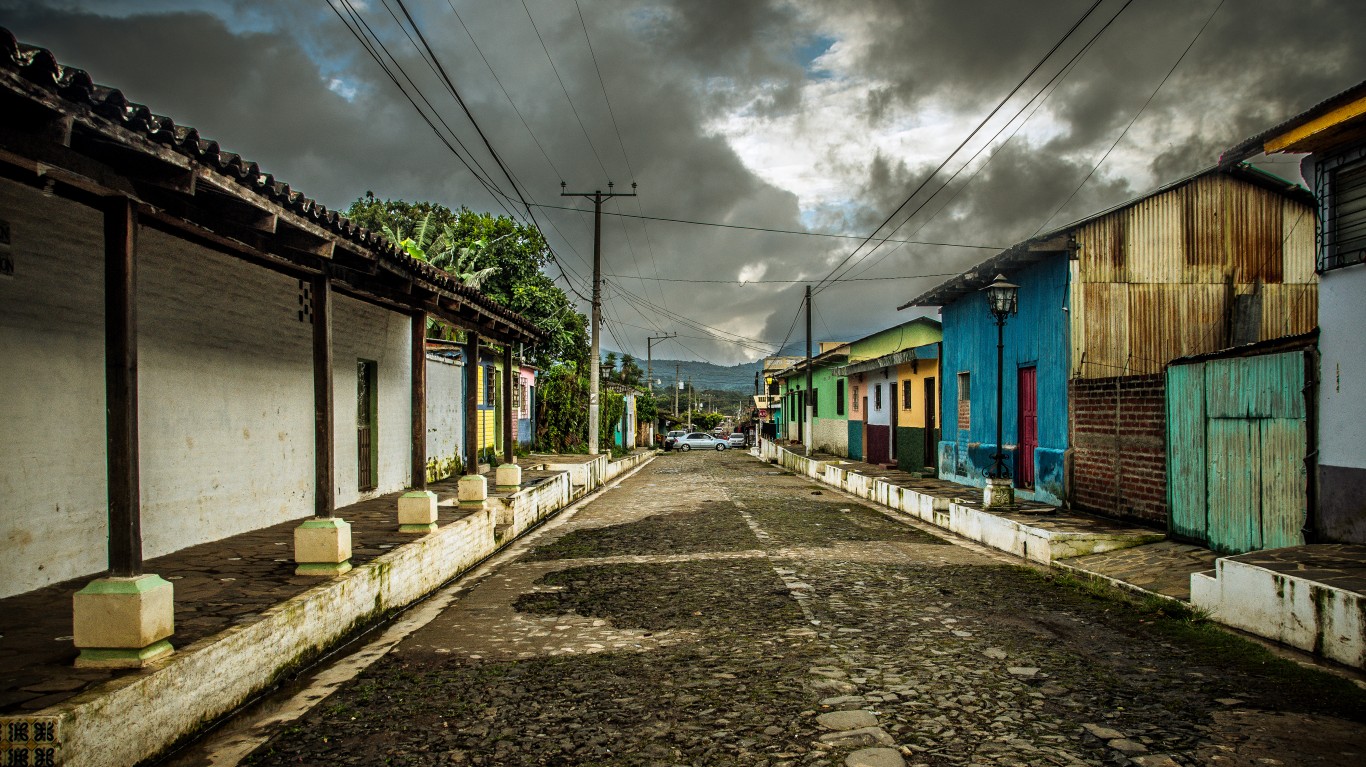
7. El Salvador
> Advisory level: Level 3: reconsider travel
> Last updated: July 13
> Population: 6.3 million
> GDP per capita: $3,930
Crime, not terrorism, is the biggest concern in El Salvador. Violent crime — murder, assault, rape, and armed robbery — occurs frequently in the Central American country. The capital city of San Salvador has been in the top 20 most dangerous cities in the world since 2014, reaching No. 3 two years ago. Extortion and narcotics and arms trafficking are widespread and the police do not have the resources to fight crime. The U.S. government advises those who travel to El Salvador to avoid walking or driving at night, not to resist a robbery attempt, and to be observant when visiting banks or ATMs.
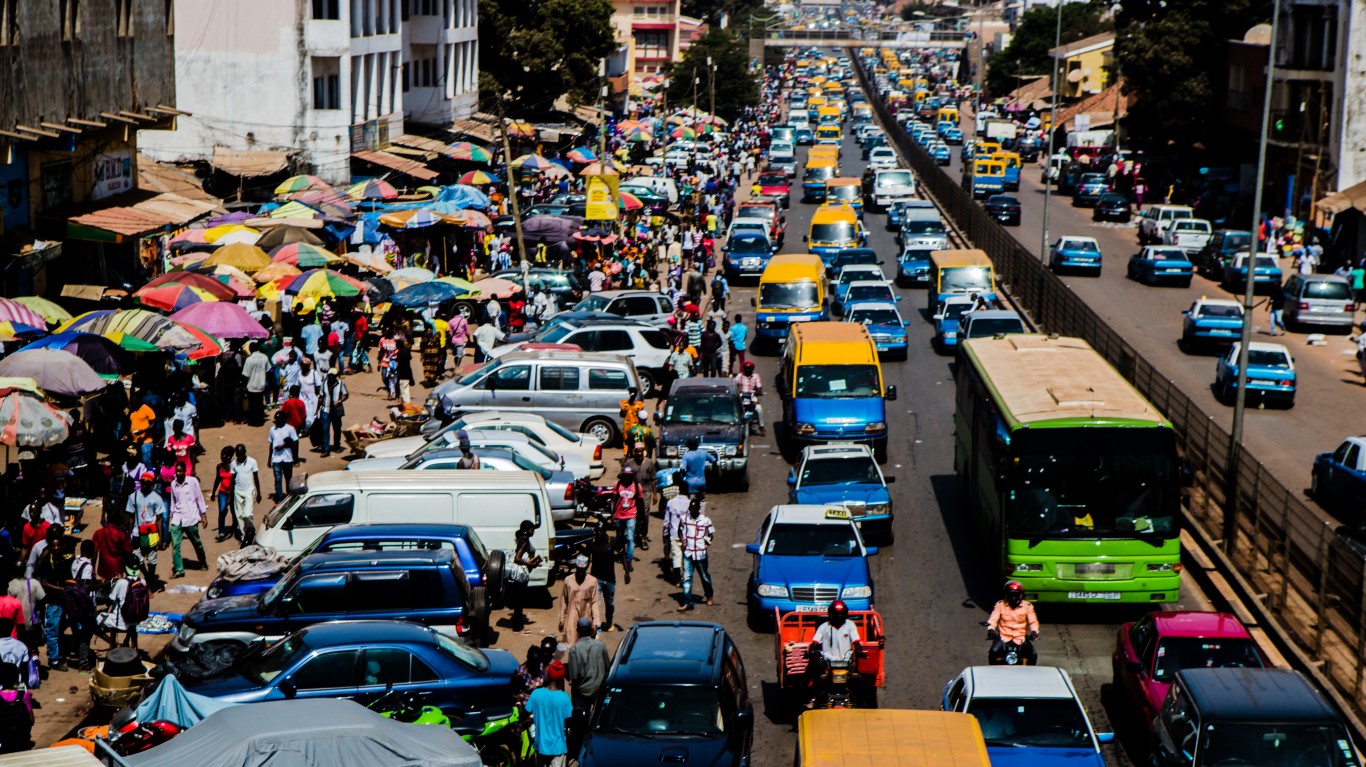
8. Guinea-Bissau
> Advisory level: Level 3: reconsider travel
> Last updated: Aug. 2
> Population: 1.8 million
> GDP per capita: $640
The U.S. government wants American citizens to reconsider travelling to Guinea-Bissau because of crime and civil unrest. In Guinea-Bissau, criminals target foreigners at the country’s airport and at the market in the center of the capital of Bissau. The State Department says local police resources are inadequate to respond effectively to criminal incidents.
Guinea-Bissau, once a Portuguese colony and a transshipment point for the slave trade, has been plagued by political instability for decades. There is no U.S. embassy in the nation, which is located on Africa’s Atlantic coast.
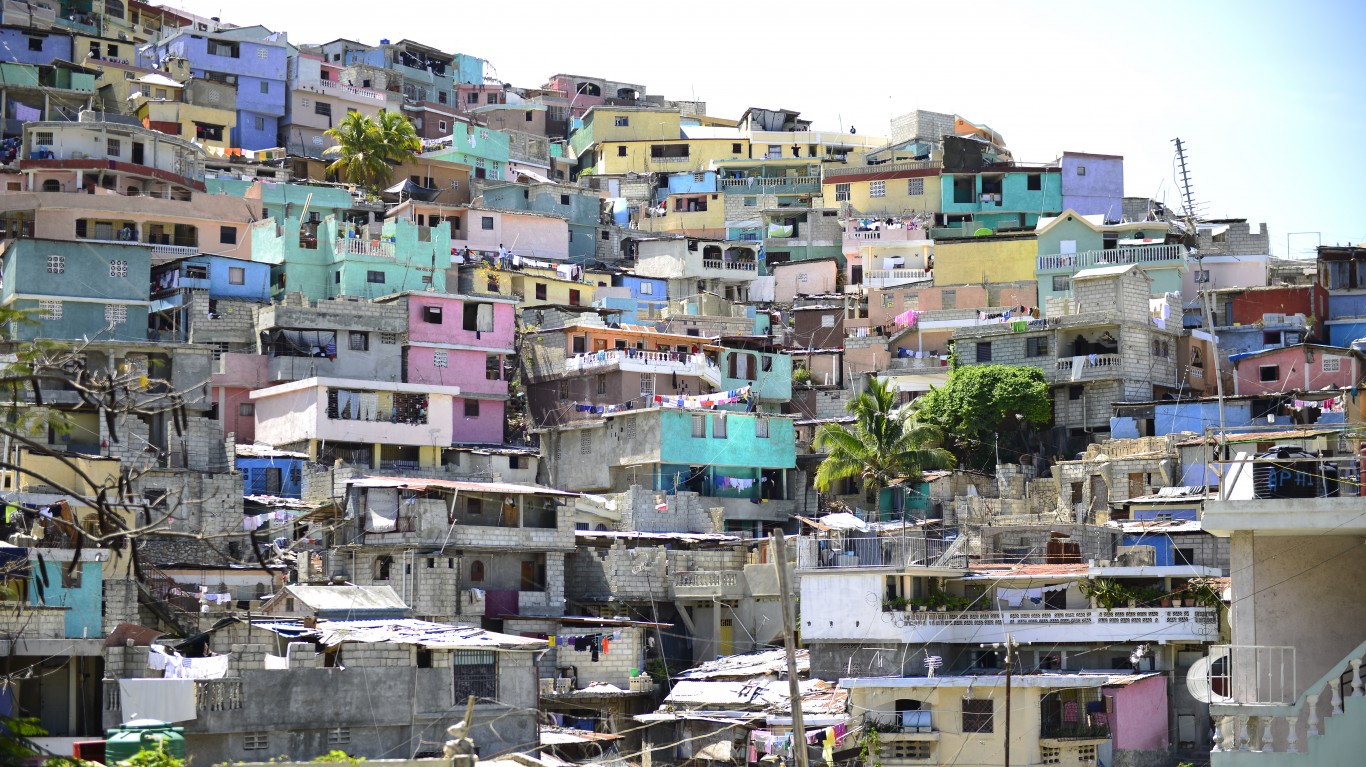
9. Haiti
> Advisory level: Level 3: reconsider travel
> Last updated: July 27
> Population: 10.8 million
> GDP per capita: $790
Crime and civil unrest are the reasons why the U.S. government is advising Americans to reconsider travel to Haiti. The nation that was devastated by an earthquake in 2010 now reels from violent crime such as armed robbery. Travelers are sometimes targeted and robbed after they arrive at the airport in Port-au-Prince. The U.S. embassy requires its employees to use official transportation to and from the airport. They are discouraged from going to establishments after dark that do not have secure parking, visiting banks and using ATMs, driving outside of Port-au-Prince at night, or using public transportation or taxis.
[in-text-ad-2]
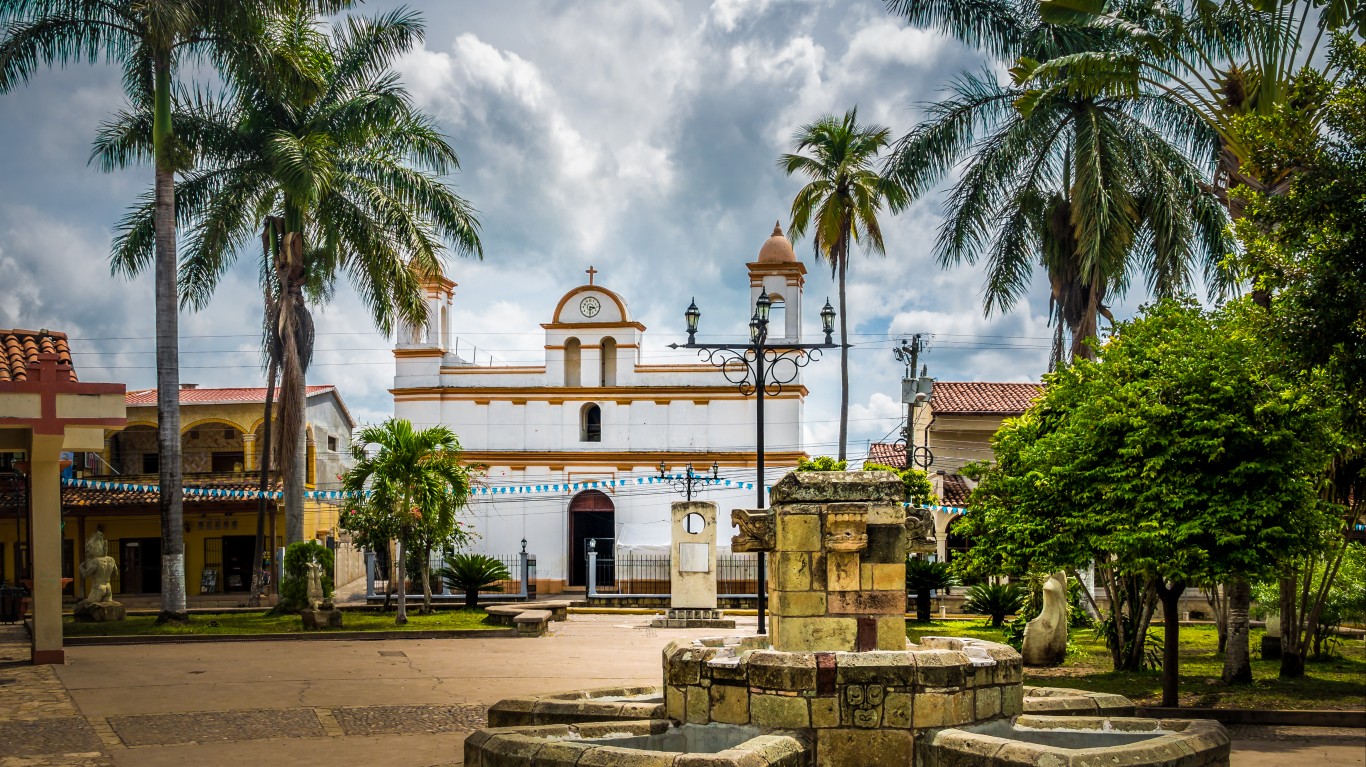
10. Honduras
> Advisory level: Level 3: reconsider travel
> Last updated: Jan. 10
> Population: 9.1 million
> GDP per capita: $2,160
Honduras is another Central American country the U.S. government advises Americans to reconsider traveling to because of crime such as extortion, rape, and narcotics and human trafficking. Since 2010, Honduras has had one of the highest murder rates in the world. Violent crime remains an issue. Bandits have been known to attack vehicles bringing tourists to hotels from the airport. Americans are advised not to travel to the region of Gracias a Dios, where danger is elevated because of the lack of emergency services.
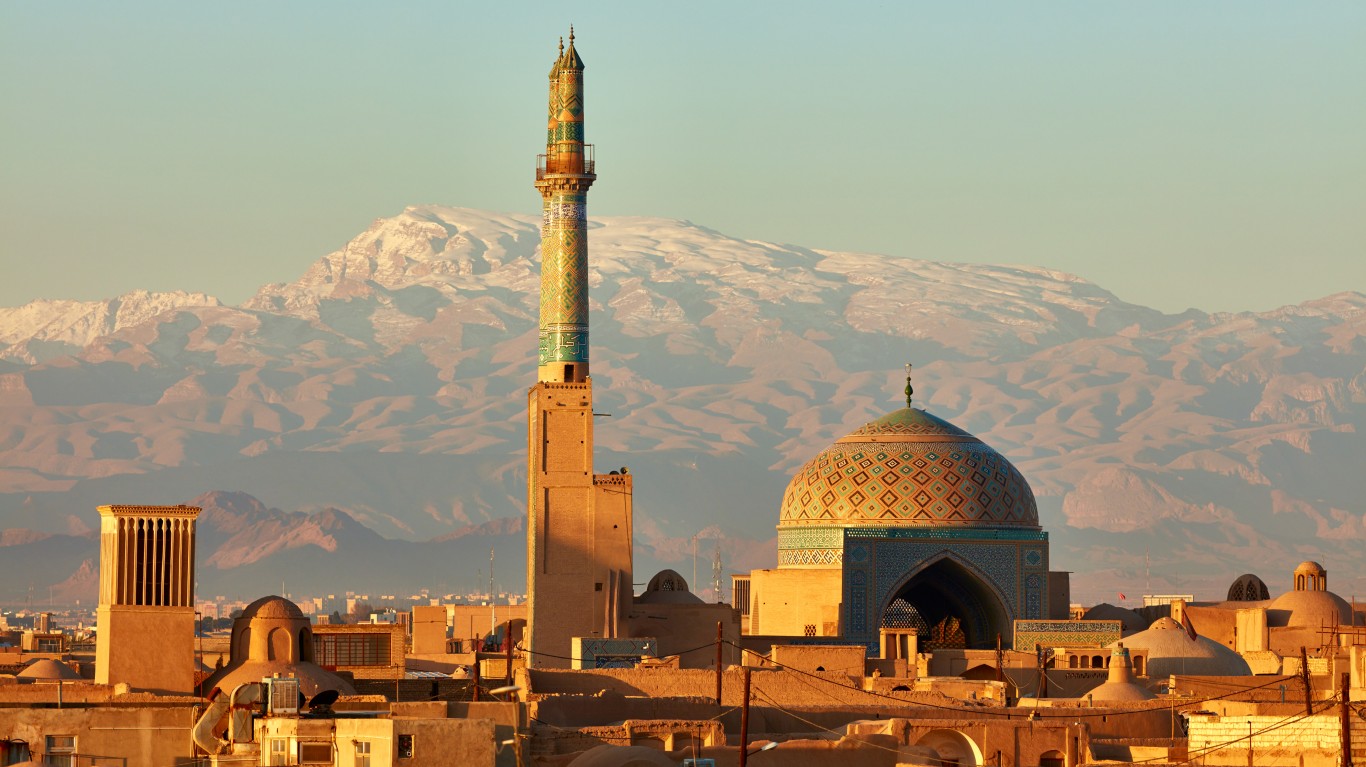
11. Iran
> Advisory level: Level 4: do not travel
> Last updated: Jan. 10
> Population: 80.3 million
> GDP per capita: $5,470
Iran is one of 11 nations with a “do not travel” advisory from the U.S. government. American citizens travelling to Iran run the risk of arbitrary detention and arrest, particularly those who hold dual U.S.-Iranian citizenship. The U.S. reinstated sanctions against Iran in August and its effects are being felt throughout the nation’s economy.
The U.S. government has not had diplomatic relations with Iran since 1979 and is unable to provide emergency services to American citizens in Iran. Switzerland serves as an intermediary for U.S. citizens in Iran, and provides emergency services.
[in-text-ad]
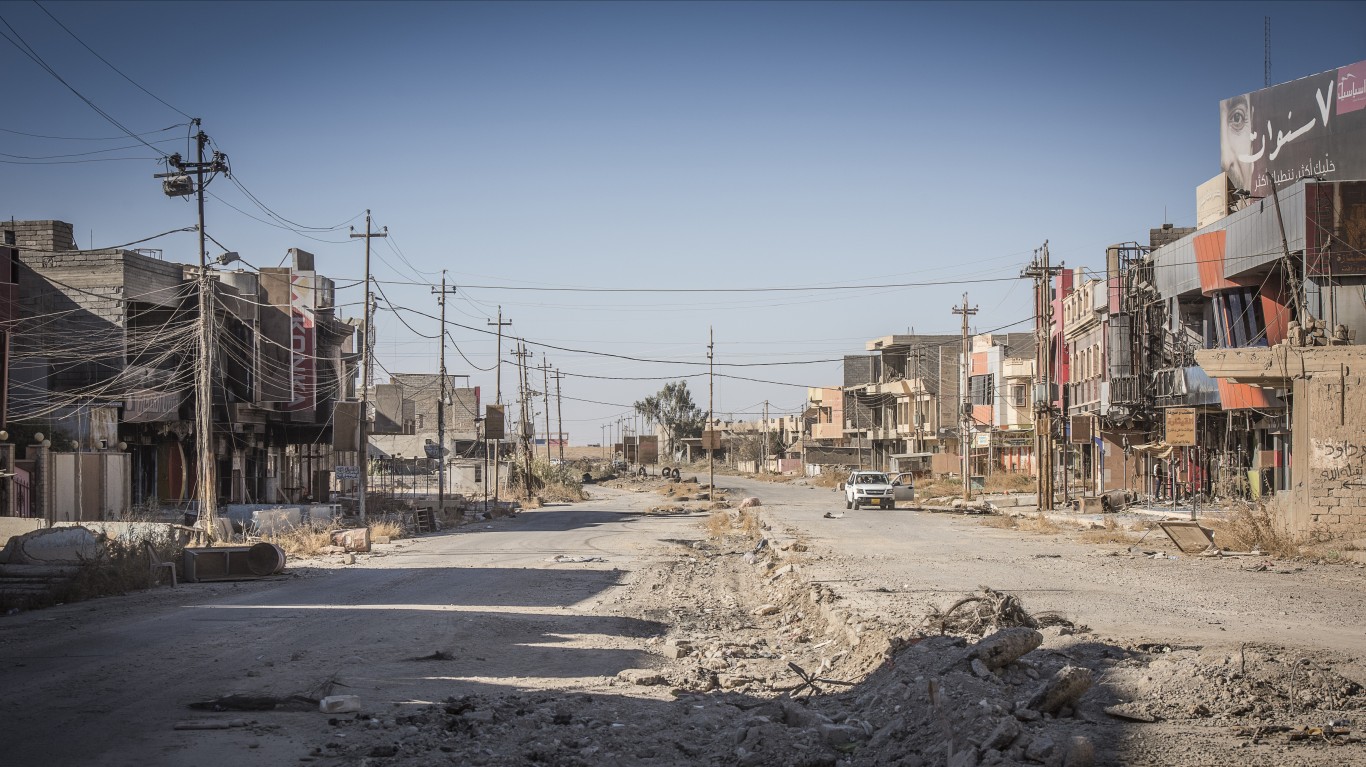
12. Iraq
> Advisory level: Level 4: do not travel
> Last updated: Aug. 17
> Population: 37.2 million
> GDP per capita: $5,420
The State Department warns Americans not to travel to Iraq over concerns of terrorism and armed conflict. Terrorist groups and militias continue to operate in the country, 15 years after the United States invaded Iraq. These terrorist groups target American citizens as well as western companies. Basra has been the site of recent unrest as five people were killed in clashes with security forces, according to Reuters.
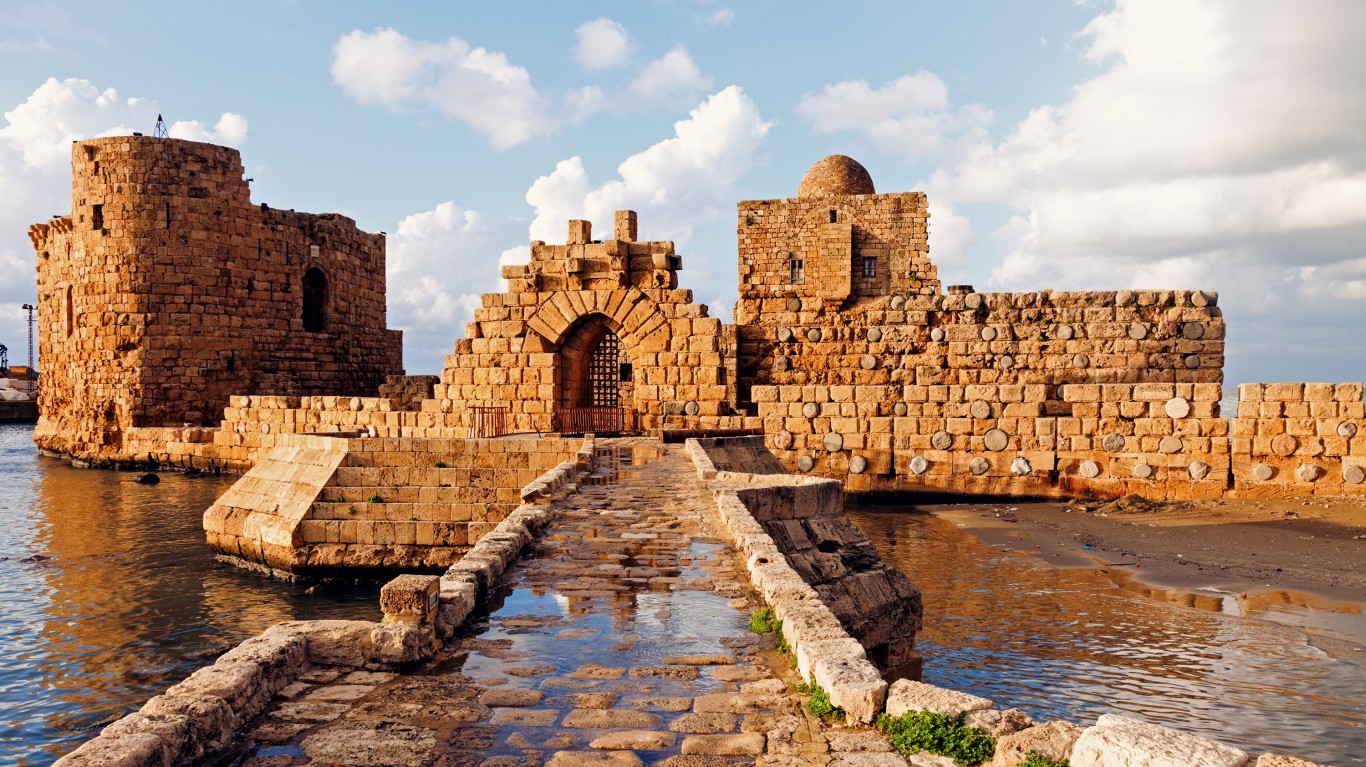
13. Lebanon
> Advisory level: Level 3: reconsider travel
> Last updated: Jan .10
> Population: 6.0 million
> GDP per capita: $7,970
Americans are discouraged from traveling to Lebanon — still struggling to recover from a 15-year civil war that ended in 1990 — because of terrorism, crime, and armed conflict. Threats of terrorist attacks and kidnapping make Lebanon an especially risky country for American travelers. U.S. citizens who choose to travel to Lebanon should be aware that officers from the U.S. embassy are not always available to assist them when they travel. According to the U.S. government, the Lebanese government cannot assure the safety of Americans.
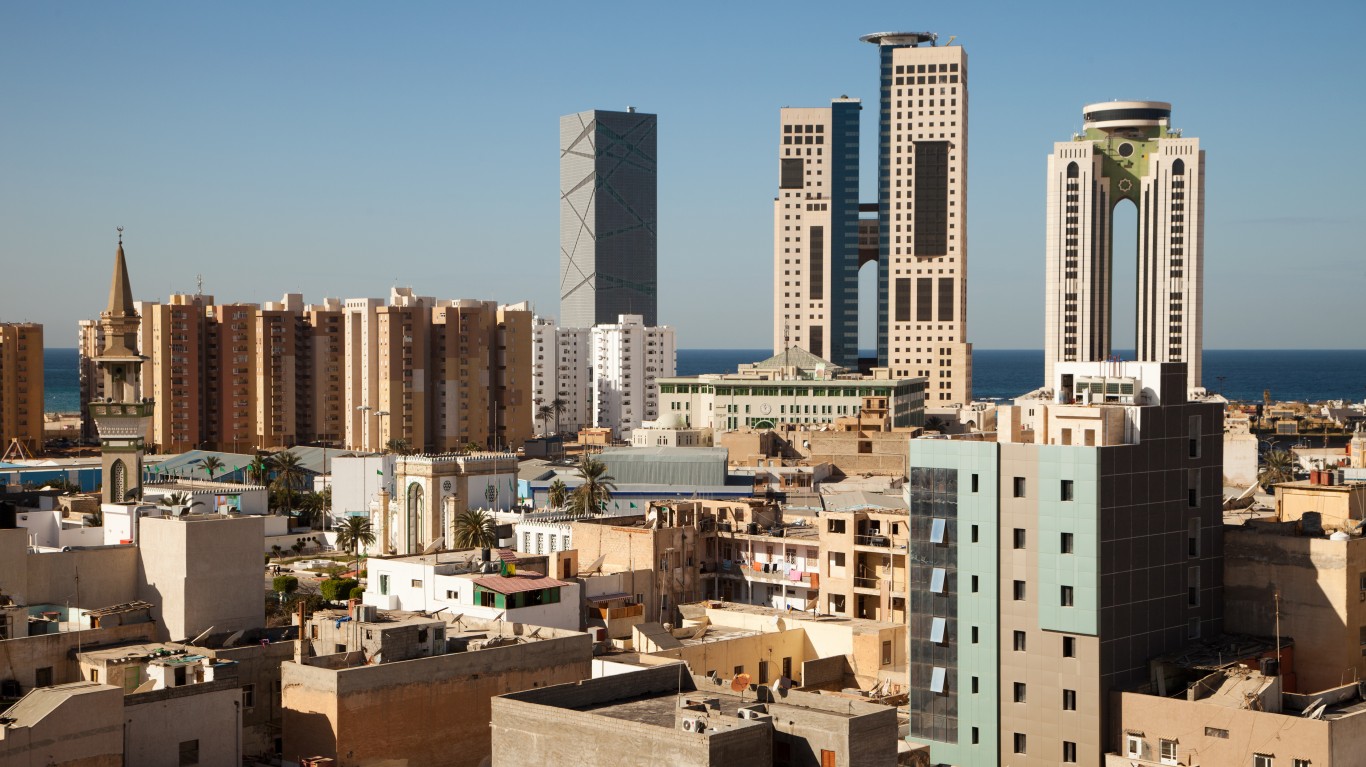
14. Libya
> Advisory level: Level 4: do not travel
> Last updated: Aug. 8
> Population: 6.3 million
> GDP per capita: $5,970
The State Department has placed a “do not travel” advisory on Libya, which has been unstable since dictator Muammar Gaddafi was toppled in 2011. The government’s ability to control crime is limited, according to the U.S. government. Militia groups sometimes detain travelers for no reason. Extremist groups are known to target Americans. The State Department said some international and national airports are closed, and flights out of airports that are open are irregular and may be canceled without warning.
[in-text-ad-2]
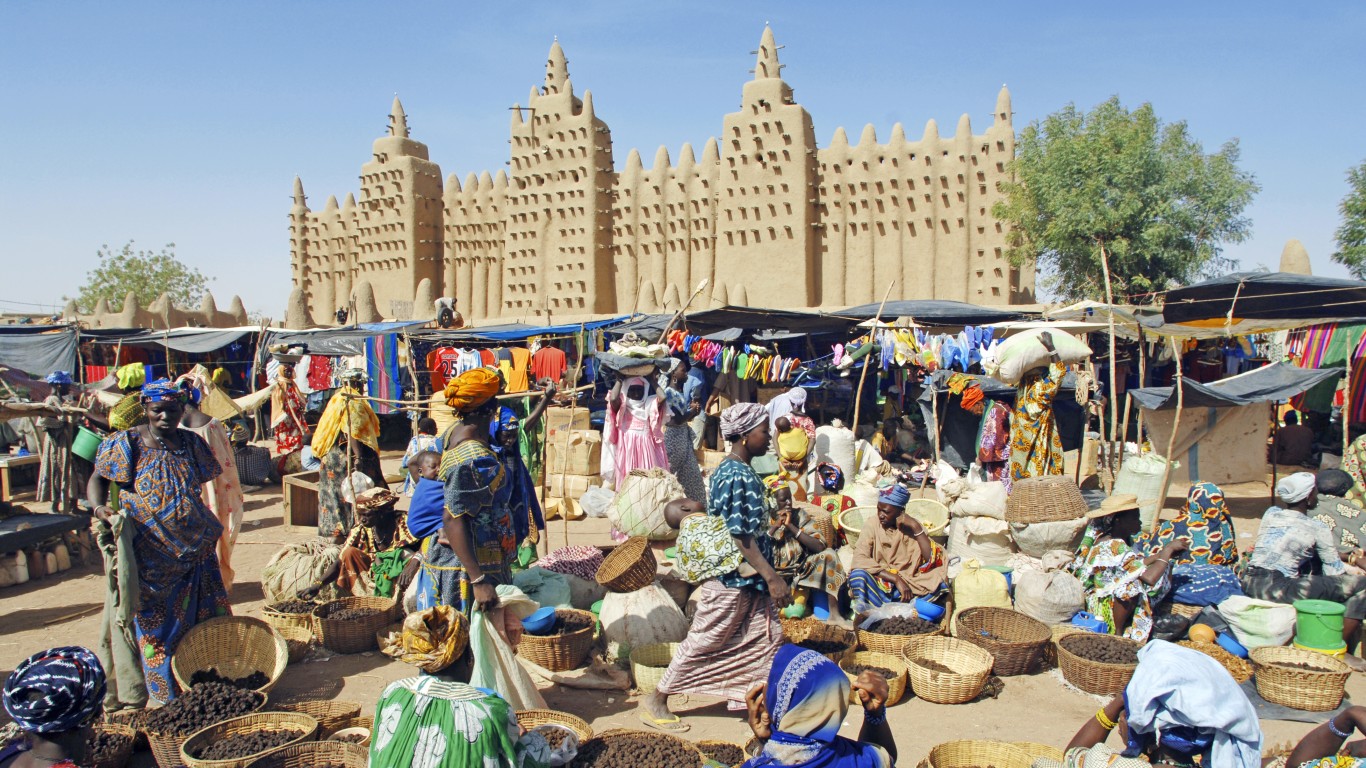
15. Mali
> Advisory level: Level 4: do not travel
> Last updated: Aug. 13
> Population: 18 million
> GDP per capita: $780
Crime and terrorism are the main reasons why the U.S. government has assigned the western African nation of Mail a “do not travel” advisory. Multiple terrorist groups, including al-Qaida in the Islamic Maghreb, operate within the landlocked nation. These groups have been known to target foreigners, claiming responsibility for a November 2015 attack on a hotel that killed 20 people, including one American. Violent crime, such as kidnapping and armed robbery, is common in northern and central Mali, and U.S. government says it is unable to provide assistance to Americans who go to those regions..

16. Mauritania
> Advisory level: Level 3: reconsider travel
> Last updated: Feb. 22
> Population: 4.3 million
> GDP per capita: $1,130
Like many other countries in the region, the presence of terror groups makes Mauritania an especially unsafe country for American travelers. Dangers include kidnapping and other violent acts. U.S. embassy officials are restricted from traveling outside of the capital of Nouakchott unless they have permission to do so. They cannot travel after dark nor can they walk alone. Like its neighbor Mali, Mauritania, which is located on the Atlantic Coast, gained independence from France in 1960.
[in-text-ad]
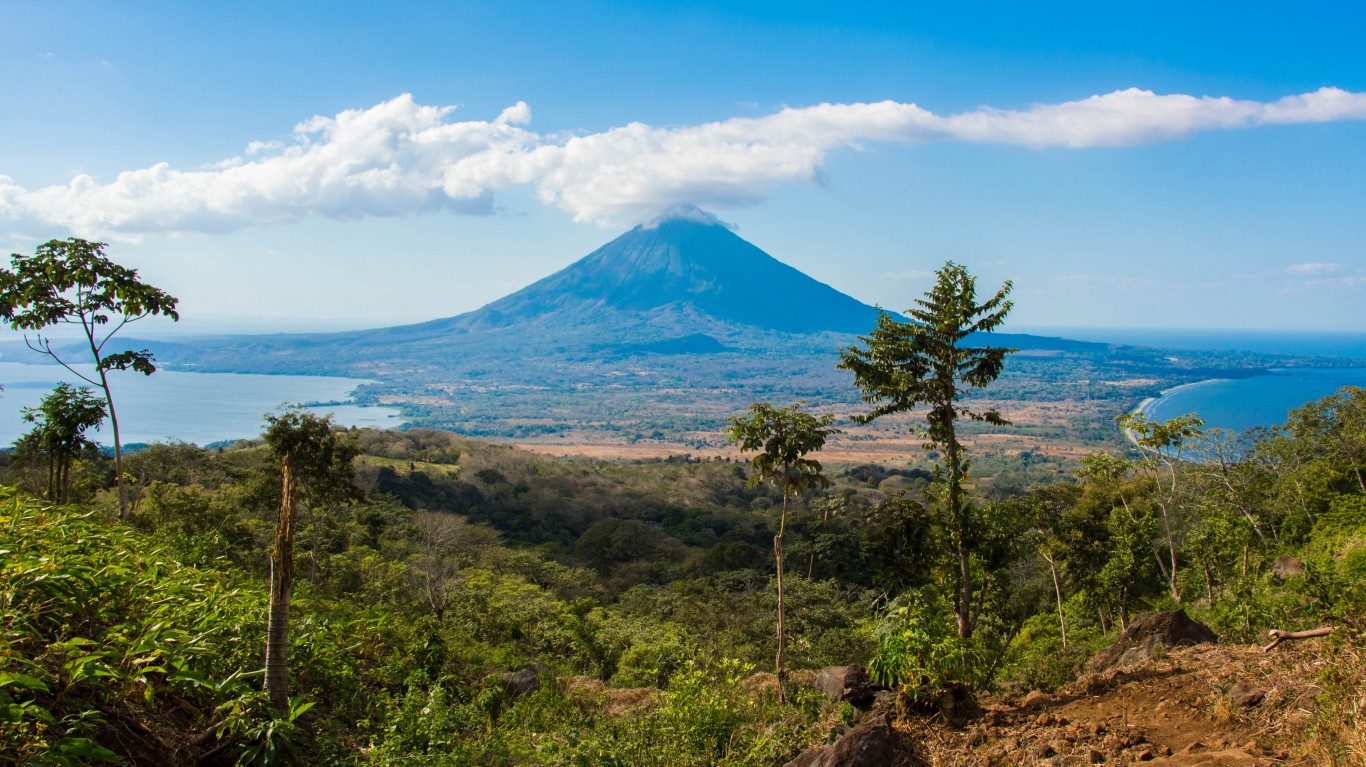
17. Nicaragua
> Advisory level: Level 3: reconsider travel
> Last updated: July 7
> Population: 6.1 million
> GDP per capita: $2,100
Instability has plagued Nicaragua, and because of this, the American government ordered non-emergency U.S. government personnel to leave the country in early July. The government is concerned over the presence of heavily armed, government-controlled paramilitary forces. The State Department says these groups often travel in vehicles that don’t have license plates. They have been known to kidnap and detain people and seize privately owned land. Demonstrations occur frequently and the Nicaraguan government has attacked demonstrators and arbitrarily detained protesters.
Employees of the U.S. government have been told to stay inside and avoid unnecessary travel after dark. They are forbidden from using public transportation because of crime fears.
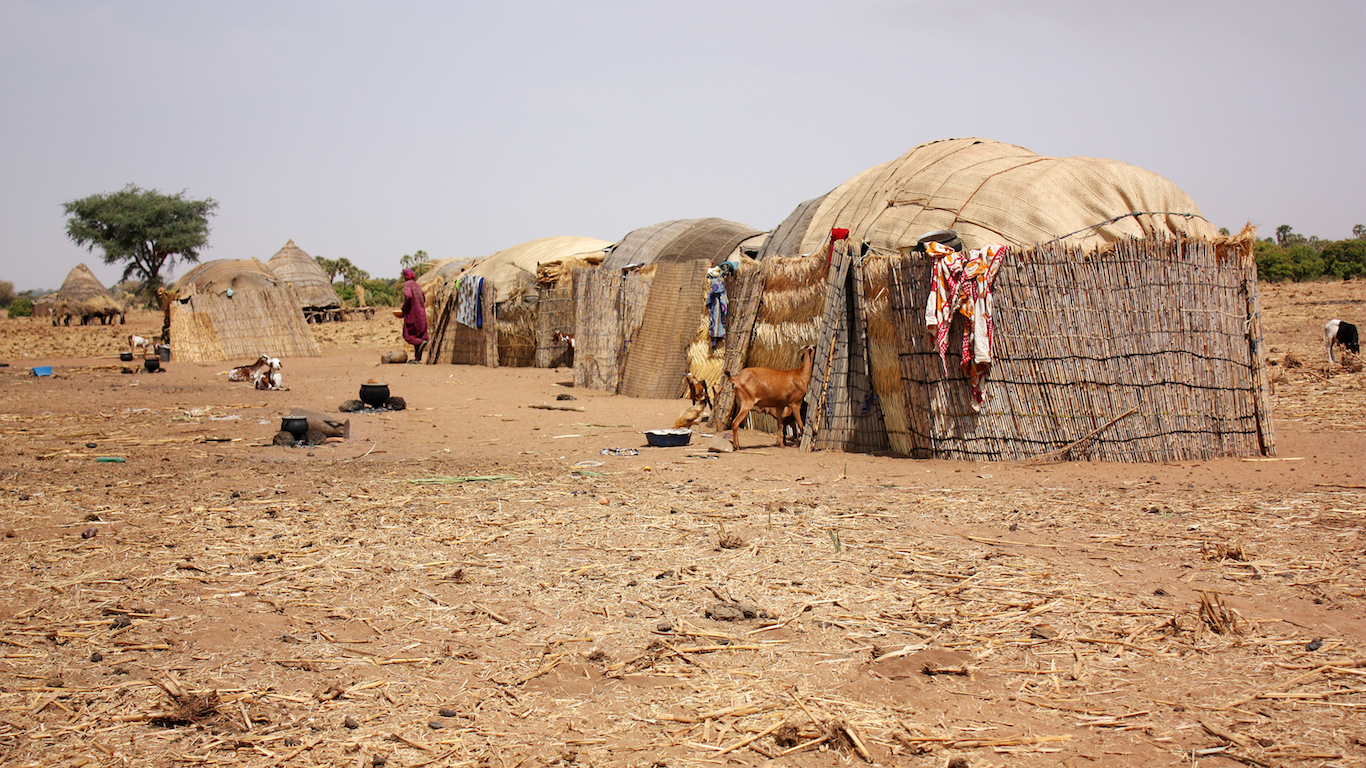
18. Niger
> Advisory level: Level 3: reconsider travel
> Last updated: Jan. 10
> Population: 20.7 million
> GDP per capita: $370
Many areas of Niger, one of the poorest nations on Earth, are remote, and the U.S. embassy’s ability to assist Americans in emergency situations is severely limited. The terrorist group Boko Haram, among others, operates in the country, and terrorist attacks have caused aid groups and foreign companies to suspend operations in the country. The U.S. government has told travelers to avoid Niger’s border region with Mali. The U.S. has a military presence in Niger, and the government is weighing withdrawing nearly all American commandos in Niger after an ambush killed four U.S. troops last October.
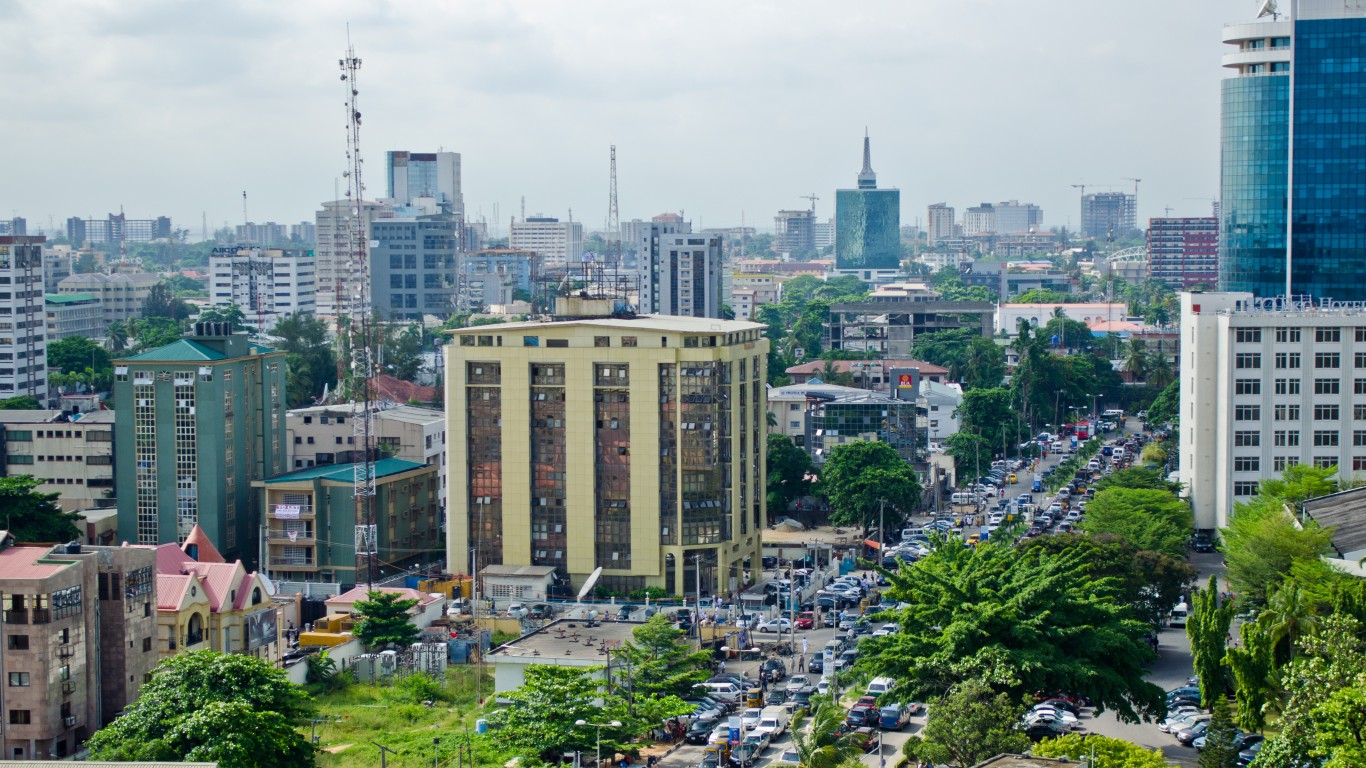
19. Nigeria
> Advisory level: Level 3: reconsider travel
> Last updated: Jan. 10
> Population: 186 million
> GDP per capita: $2,450
Due to the threat of terrorism, Americans are advised to avoid large crowds and places such as shopping malls, churches, clubs, and markets in Nigeria, Africa’s most populous nation. The terrorist group Boko Haram, among others, operates in the country. Kidnappings and robberies are also common in certain parts of Nigeria. Travelers are also advised to avoid going to the Gulf of Guinea over piracy concerns.
[in-text-ad-2]
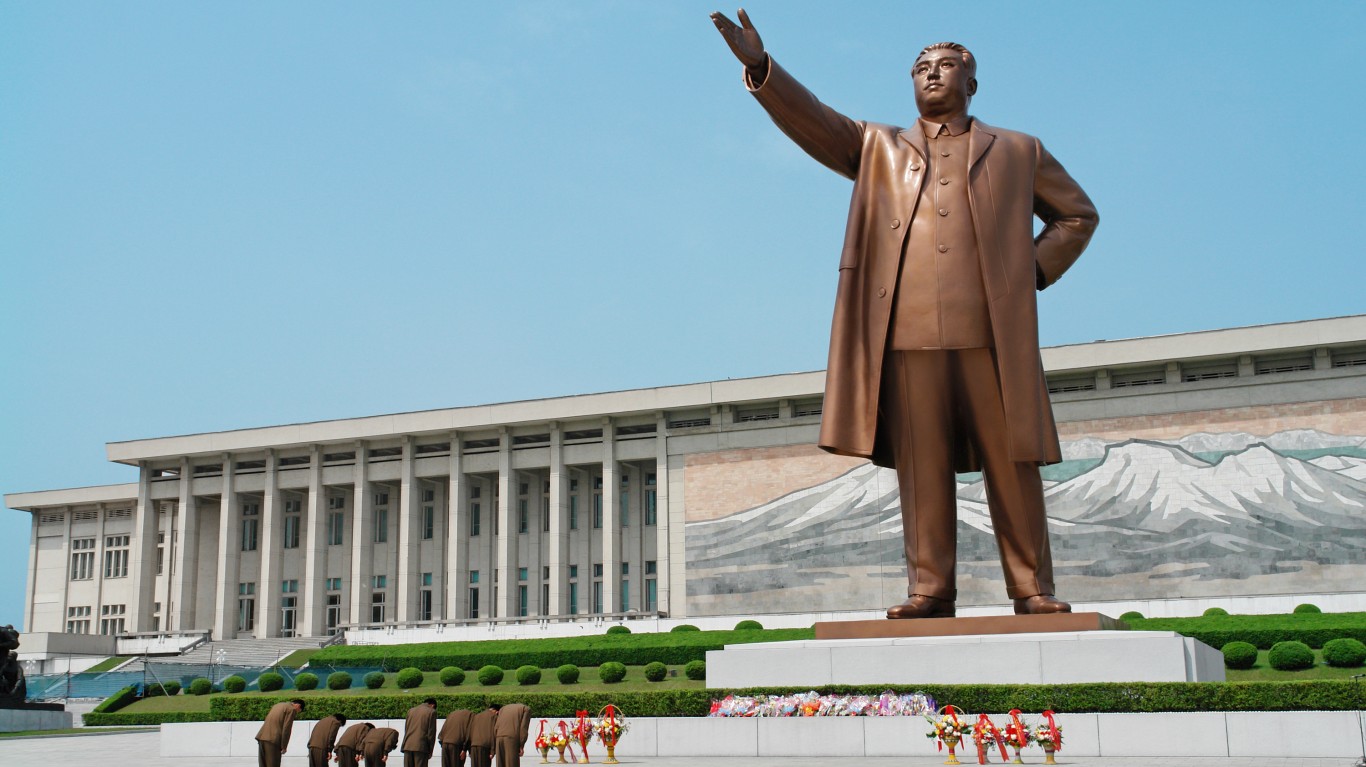
20. North Korea (Democratic People’s Republic of Korea)
> Advisory level: Level 4: do not travel
> Last updated: Aug. 31
> Population: 25.4 million
> GDP per capita: N/A
In North Korea, the totalitarian government poses the greatest risk to American visitors, as evidenced by the fate of American student Otto Warmbier, who died after he was arrested by North Korean authorities. Electronic devices are subject to search for prohibited content, which includes materials critical of the North Korean government. U.S. citizens risk arrest, fines, long-term detention, and hard labor for some transgressions that are not considered crimes in the United States.
The U.S. government is unable to provide emergency services to Americans in North Korea as it does not have diplomatic relations with the communist nation. Tensions between the two countries have been reduced, and President Trump met North Korean leader Kim Jong Un earlier this year as both sides are working to denuclearize the Korean peninsula.

21. Pakistan
> Advisory level: Level 3: reconsider travel
> Last updated: Aug. 1
> Population: 193.2 million
> GDP per capita: $1,500
Deadly terrorist attacks are common in Pakistan, and they frequently target areas where Americans and other westerners convene. The Balochistan and Khyber Pakhtunkhwa provinces have been targets of frequent terrorist attacks, according to the U.S. government. Americans also have been the victims of kidnappings. The U.S. government has restricted travel in Pakistan for its employees, who are prohibited from using public transportation or staying at hotels. Relations between Pakistan and the U.S. are rocky, and U.S. Secretary of State Mike Pompeo went to Pakistan in early September to try and improve them.
[in-text-ad]
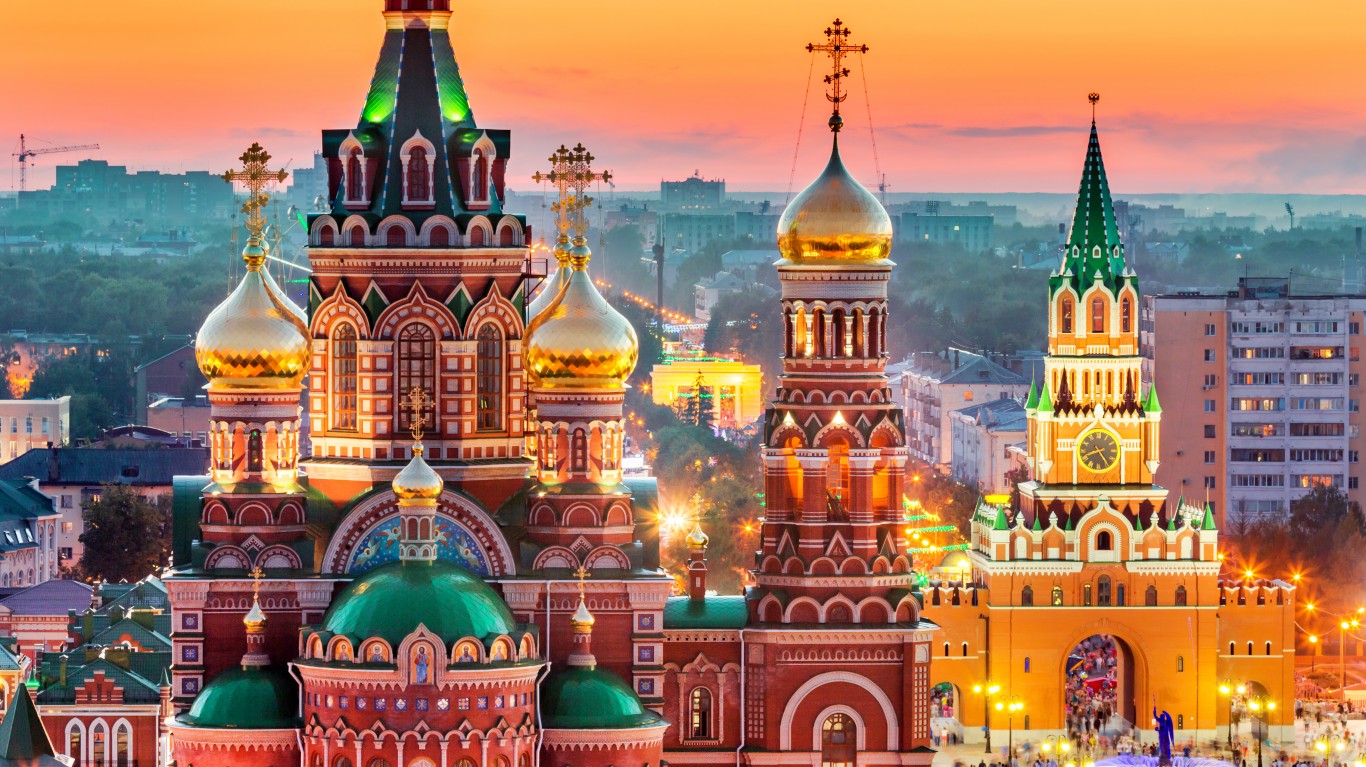
22. Russia
> Advisory level: Level 3: reconsider travel
> Last updated: June 15
> Population: 144.3 million
> GDP per capita: $9,720
One of two European countries on the list, Americans have been advised to reconsider travel to Russia because of terrorism, civil unrest, and harassment. Americans have been advised not to travel to the north Caucasus because of civil disturbances and terrorism, nor should they travel to Crimea because of occupation by Russia, which annexed Crimea from Ukraine in 2014.
The State Department says American citizens have been harassed, mistreated, and extorted by law-enforcement and other officials. Russia has been known to impose restrictions on those with dual U.S.-Russian citizenship. Because the U.S. claimed Russia interfered in the 2016 U.S. presidential election, tension between the United States and Russia has risen, and the Russian government has forced the U.S. to trim its diplomatic presence in Russia. This reduction has limited the U.S. government’s ability to provide services to American citizens in Russia.
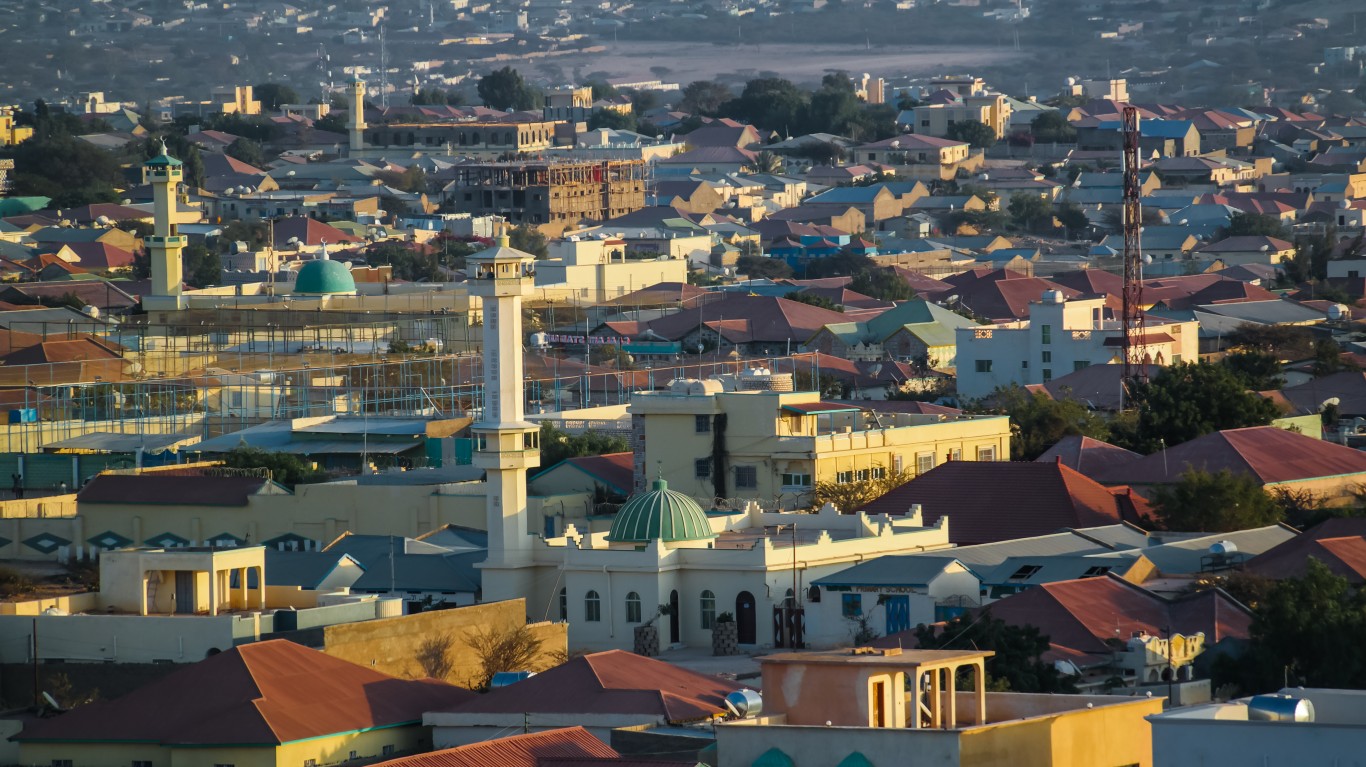
23. Somalia
> Advisory level: Level 4: do not travel
> Last updated: July 9
> Population: 14.3 million
> GDP per capita: N/A
Somalia, an African nation located on the Indian Ocean, has been a haven for terrorism. At least six people were killed after a suicide bomber detonated a vehicle containing explosives on Sept. 2 in the Somali capital of Mogadishu. Kidnapping and murder also are widespread in Somalia, including in the areas of Puntland and Somaliland. Illegal roadblocks are a fact of life in the country. Pirates also are active in the international waters near Somalia.
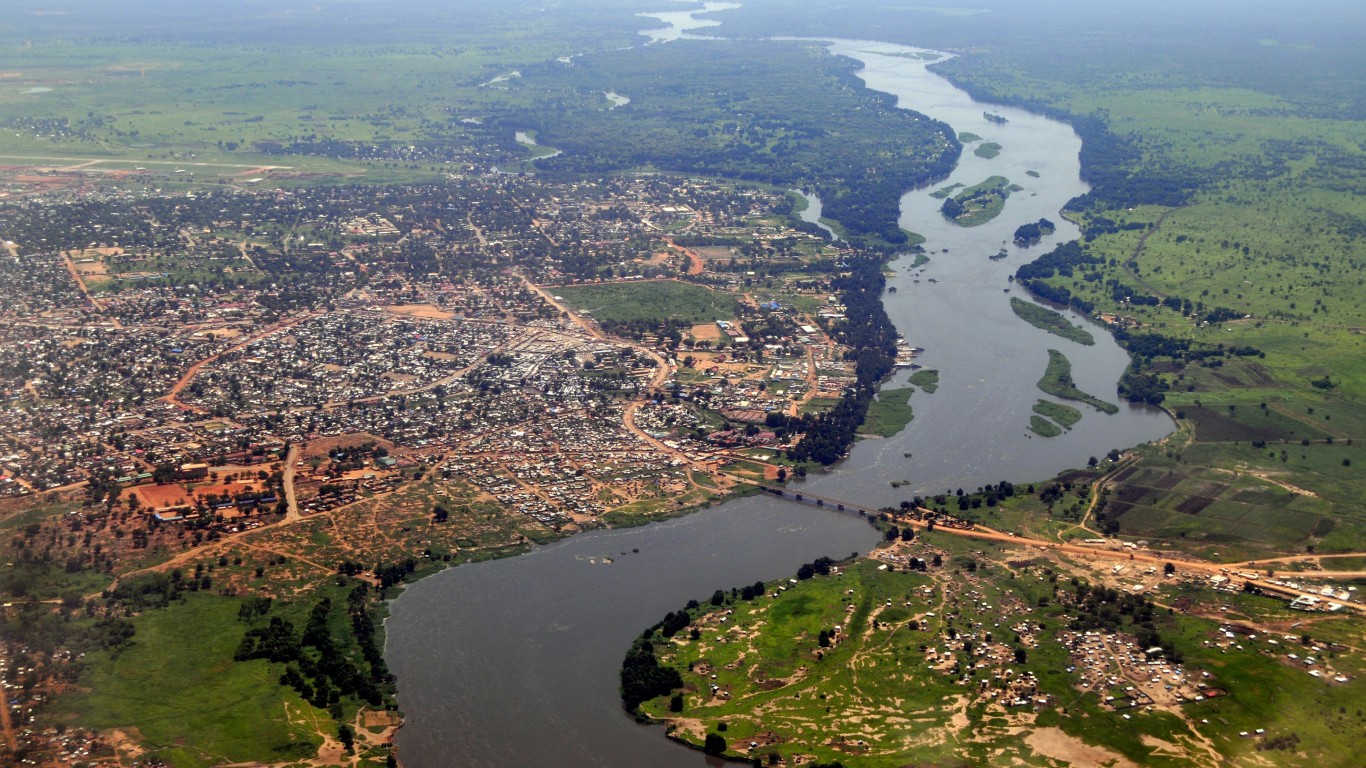
24. South Sudan
> Advisory level: Level 4: do not travel
> Last updated: Jun. 28
> Population: 12.2 million
> GDP per capita: $390
South Sudan gained independence in 2011. But peace has been elusive for the fledgling nation, which descended into conflict two years after its creation. About 4 million people have been displaced by conflict. The ongoing ordeal is the reason the U.S. government has advised Americans not to travel to South Sudan. U.S. government employees are under sever curfew and can only travel in armored vehicles in the capital Juba. Because of frequent crime, walking anywhere by embassy personnel is discouraged.
[in-text-ad-2]
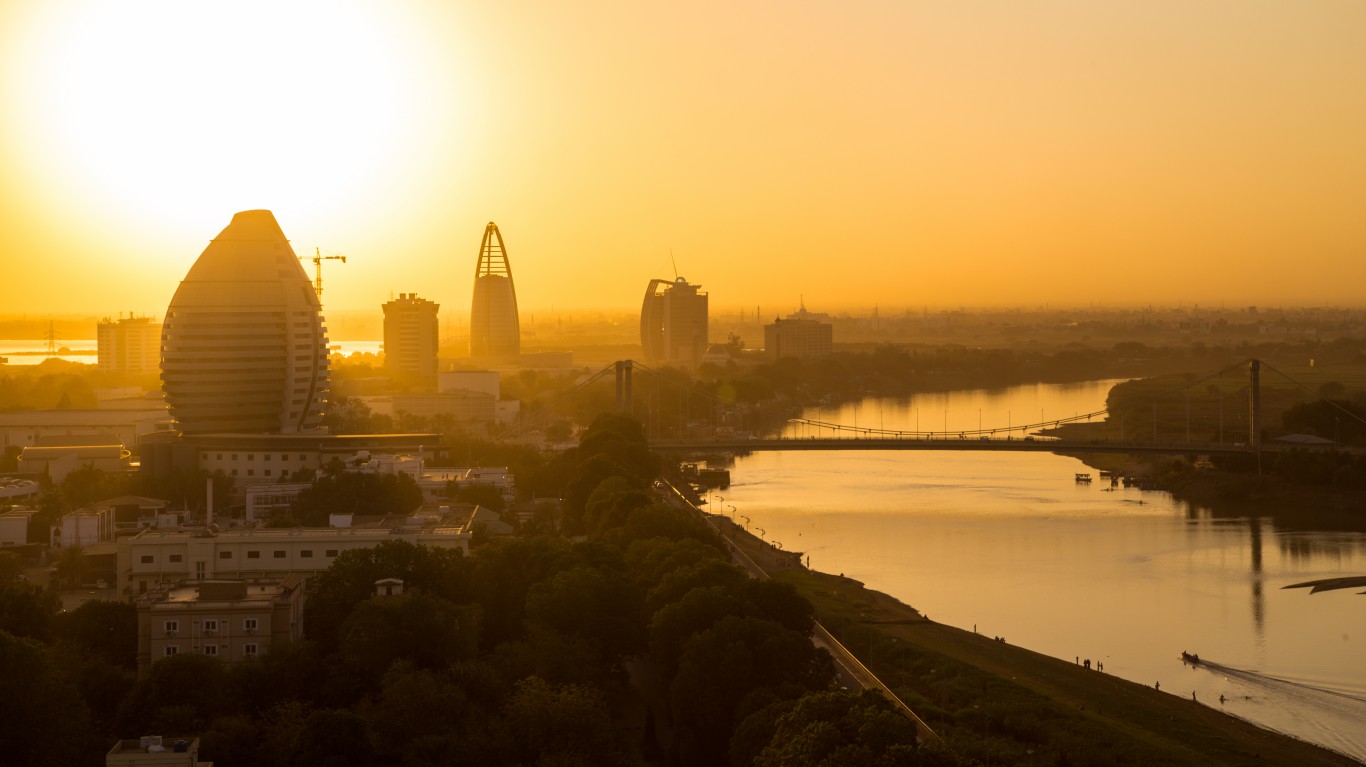
25. Sudan
> Advisory level: Level 3: reconsider travel
> Last updated: July 2
> Population: 39.6 million
> GDP per capita: $2,140
American travelers are advised to reconsider traveling to Sudan because of terrorism and civil unrest. The concern is most acute in the Darfur region, Blue Nile state, and South Kordofan state because of crime and armed conflict. The U.S. government has advised Americans not to travel to those areas. Nearly one-third of Darfur’s population lives in refugee camps.
The State Department says in its advisory that terrorist groups are targeting the capital Khartoum. Because of the heightened security concerns in areas such as Kassala and North Kordofan states, security forces have amassed strong arrest powers. This has led to frequent detentions, including foreigners. Curfews may be enforced with little warning. The Sudanese government does not recognize dual citizenship and considers those holding it to be Sudanese citizens.
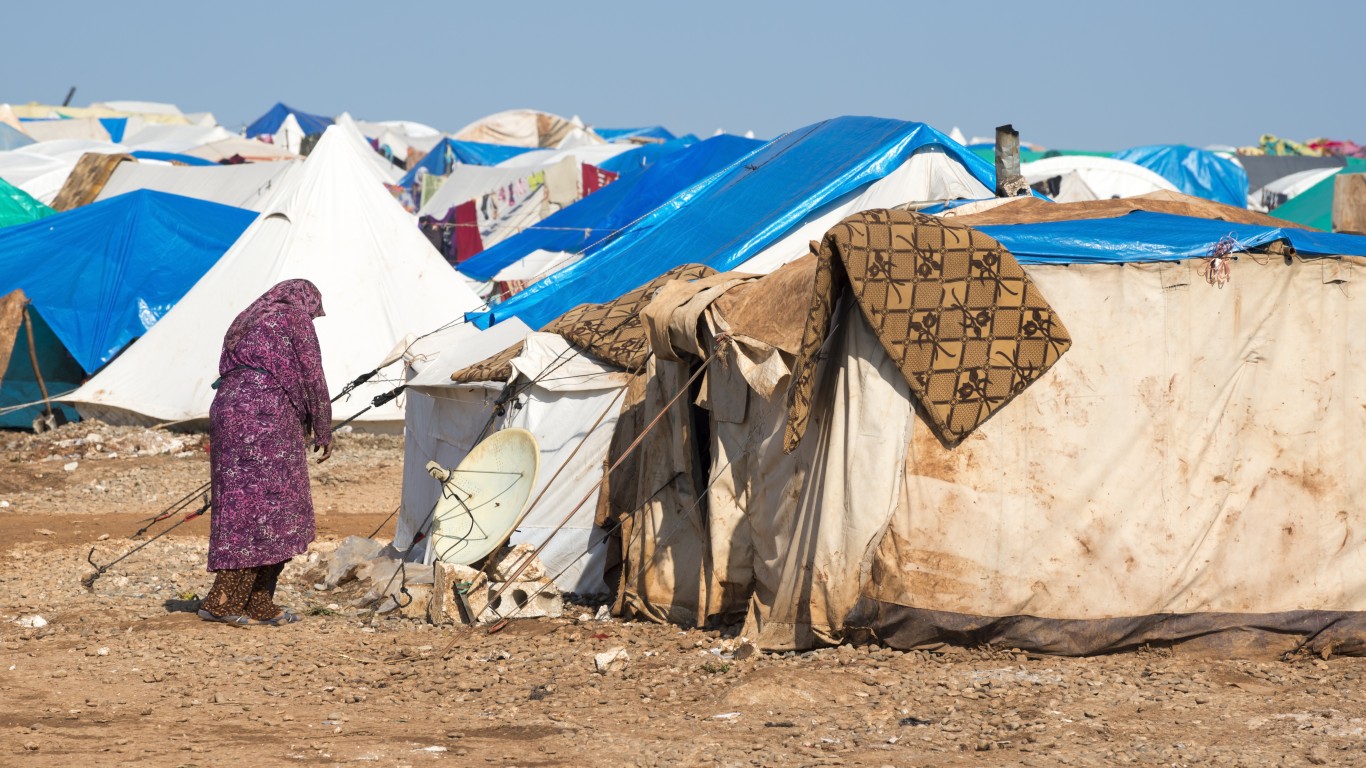
26. Syria
> Advisory level: Level 4: do not travel
> Last updated: Jan. 10
> Population: 18.4 million
> GDP per capita: $1,840
The U.S. government issues its strongest warning for those considering travel to Syria. The State Department says that “no part of Syria is safe from violence. Kidnappings, the use of chemical warfare, shelling, and aerial bombardment have significantly raised the risk of death or serious injury.” Since the civil war began in Syria seven years ago, more than 400,000 people have been killed, according to the World Bank.
The U.S. embassy in Damascus suspended operations in February 2012, and the United States does not have diplomatic relations with Syria.
[in-text-ad]
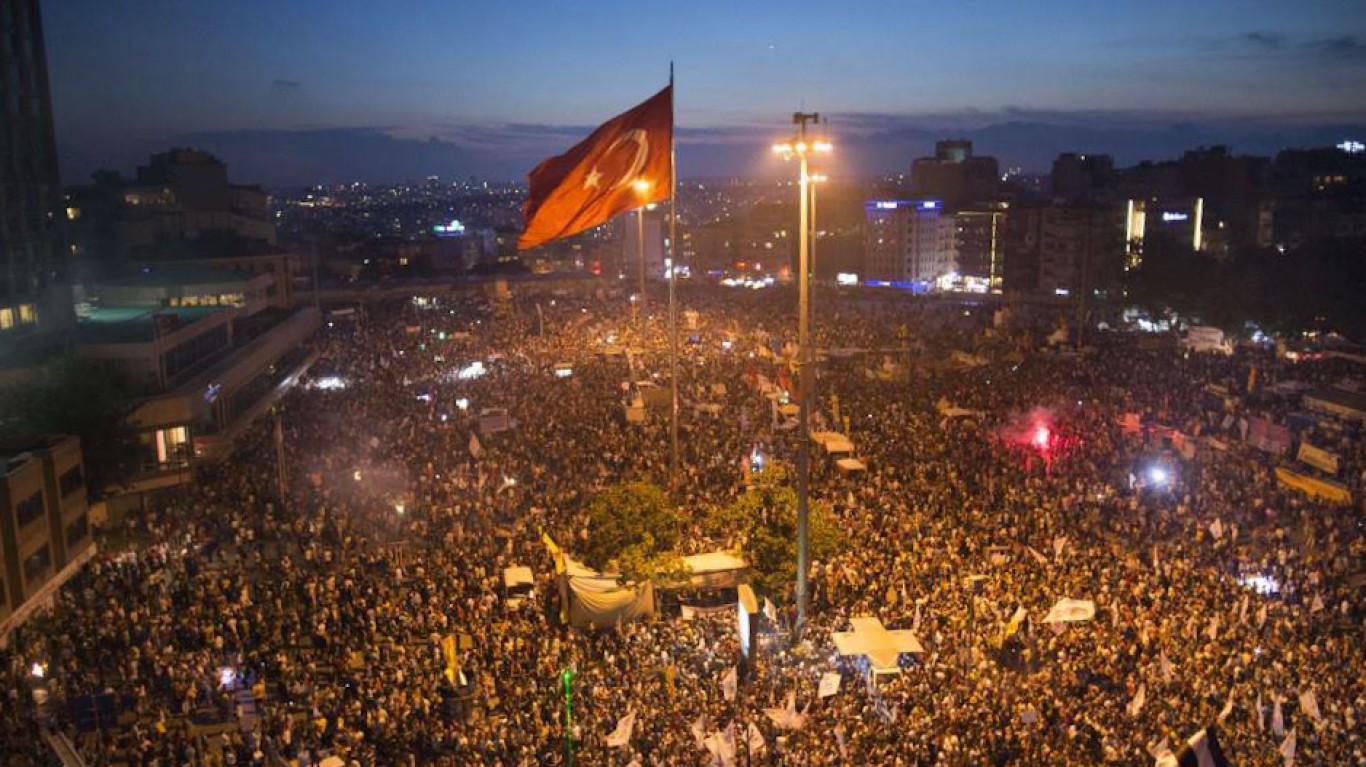
27. Turkey
> Advisory level: Level 3: reconsider travel
> Last updated: June 28
> Population: 79.5 million
> GDP per capita: $11,230
Because Syria is on Turkey’s southern border, the U.S. government has advised Americans to reconsider travel to Turkey because of terrorism. Americans are advised not to travel to areas along the Turkey-Syria border and certain southeastern provinces because of terrorism concerns. Terrorist groups target Western tourists and expatriates for kidnapping and assassination. Following a failed coup d’etat in 2016, security forces in Turkey have detained people they suspect are linked with alleged terrorist groups.The country lifted its state of emergency in July, two years after the coup attempt.
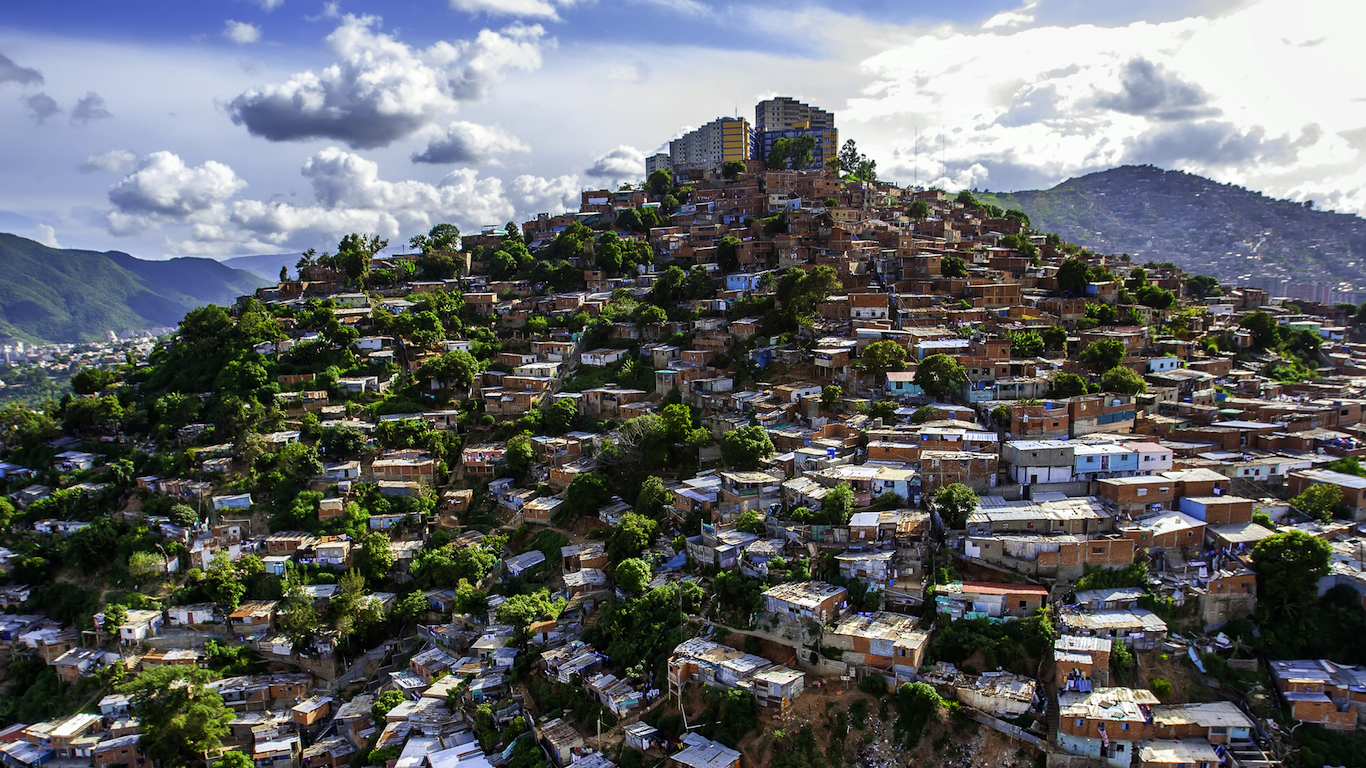
28. Venezuela
> Advisory level: Level 3: reconsider travel
> Last updated: May 29
> Population: 31.6 million
> GDP per capita: $12,780
Venezuela’s cities, including the capital Caracas, are among the most violent in the world — one of the reasons why the U.S. government is advising Americans to reconsider travel to the South American nation. Political unrest is roiling Venezuela, where there are shortages of everything from food to water to electricity. Demonstrations have led to violence, and the State Department has said security forces have detained and arrested U.S. citizens without cause. There are also health-care concerns. In May, the U.S. Centers for Disease Control and Prevention issued a notice for Americans to avoid nonessential travel to Venezuela because the health-care system there has fallen apart.
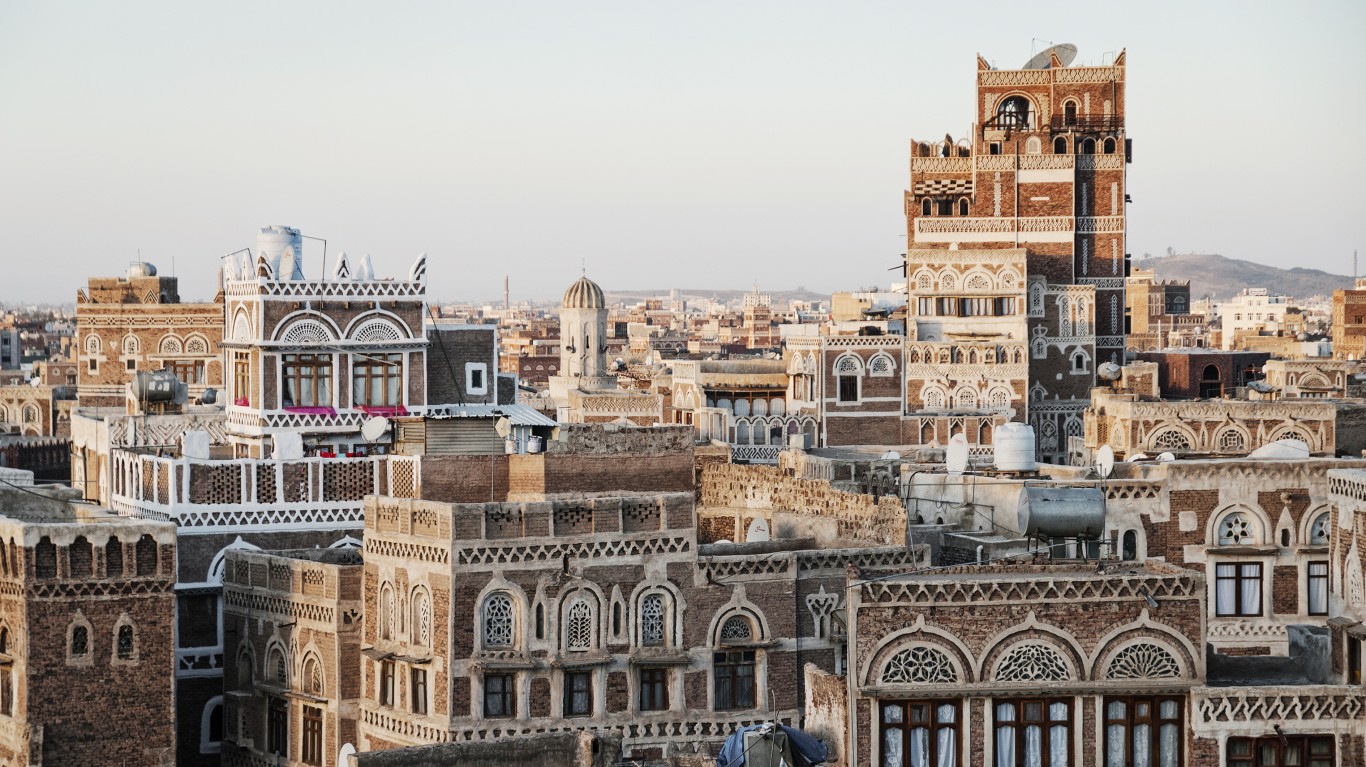
29. Yemen
> Advisory level: Level 4: do not travel
> Last updated: July 5
> Population: 27.6 million
> GDP per capita: $1,030
The U.S. government strongly urges Americans not to go to Yemen, saying “no part of Yemen is immune to violence.” Yemen descended into civil war in 2011, and the nation on the Arabian peninsula has been torn apart. A coalition led by Saudi Arabia is backing government forces of President Abed Rabbo Mansour Hadi against rebels led by former President Ali Abed Allah Saleh. The conflict has led to the destruction of housing, medical facilities, schools, and utilities. The country is also struggling with the world’s worst cholera outbreak that has generated more than 1 million possible cases of the illness since April 2017. About 16.4 million people lack essential health care, according to a report from the BBC.
Detailed Findings
The State Department has four advisory levels for travelers: level 4 – do not travel; level 3 – reconsider travel; level 2 – exercise increased caution; and level 1 – exercise normal precautions. Of the 209 countries the State Department has advisories for, 11 are classified “do not travel.” All 11 are in Africa or Asia. The 17 nations the State Department recommends that Americans reconsider traveling to are in Asia, Africa, Europe, and South and North America.
Travel warnings can be issued for many reasons and can also vary in concern. Many of the Middle Eastern and African countries on this list are unsafe because of the threat of terrorism and dangers arising from political instability. Countries such as Yemen, South Sudan, and Syria have been embroiled in protracted armed conflicts that have destabilized those nations.
In North Korea, the main threat to American citizens is the government itself. Americans risk arrest, long-term sentences, and even hard-labor for infractions not considered criminal in the U.S. Punishable offenses in North Korea include taking unauthorized photographs, shopping at stores not designated for foreigners, and disrespecting the country’s current and former leaders. Otto Warmbier, an American student who had been imprisoned in North Korea for 17 months, suffered severe brain damage while in the custody of the North Korean government and died last year before his body was returned home to Ohio.
Methodology
To identify the countries the U.S. Government doesn’t want you to visit, 24/7 Wall St. reviewed the State Department’s list of countries with standing travel warnings as of Aug. 31, 2018. Reasons for issuing a travel warning might include unstable government, civil war, ongoing crime or violence, or frequent terrorist attacks. All nations’ advisory levels have been updated this year. Population figures and GDP per capita figures are for the most recent year available and are from the World Bank.
Finding a qualified financial advisor doesn’t have to be hard. SmartAsset’s free tool matches you with up to 3 fiduciary financial advisors in your area in 5 minutes. Each advisor has been vetted by SmartAsset and is held to a fiduciary standard to act in your best interests. If you’re ready to be matched with local advisors that can help you achieve your financial goals, get started now.
Thank you for reading! Have some feedback for us?
Contact the 24/7 Wall St. editorial team.